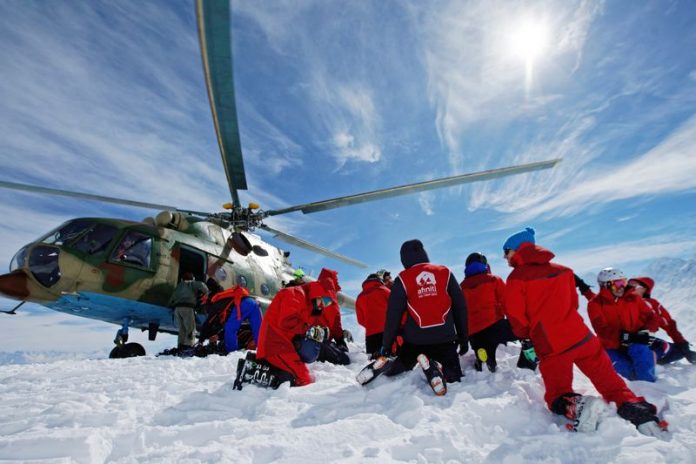In the northern snow-capped peaks of Pakistan, Zia Chishti disembarked off a helicopter and skied downhill on a mission to convince investors, clients and company executives that the nation once called by The Economist “the world’s most dangerous place” is now safe for business.
Chishti, who grew up in Lahore, gathered a group from more than a dozen countries including Alessandro Benetton, a heir to the billionaire family that owns the iconic namesake Italian clothing company, and Huawei Technologies Co. rotating Chief Executive Officer Guo Ping earlier this year to Pakistan, the back-end base for some of his TRG Holdings businesses. Last month, his artificial intelligence company signed a deal with Huawei, which will help its push into Eastern markets including China, Japan and Australia.An Afiniti ski group gets dropped off at the Karakoram mountains by a helicopter on Feb. 15, 2017.Photographer: James Ahmed/Afiniti
For Chishti, ensuring his clients understand that Pakistan, which has struggled against internal militant groups, has changed since The Economist report a decade ago is critical because many of his employees who provide customer solutions, sales support and marketing to clients including Sprint Corp. and Caesars Entertainment Corp. are based in the South Asian nation. Chishti has added more people in Pakistan, a move that will also help him keep costs under control as his AI unit prepares for an initial public offering in the U.S.
“Pakistan by any reasonable and adaptive measure is an extremely safe place to do business,” said Chishti, whose office oversees the White House, said in an interview by phone. “All in all it’s a very favourable place to do business and the world perception just has to catch up.”
Despite a widespread negative perception over the country’s security record, multiple military operations have curbed domestic insurgents after a Pakistani Taliban massacre at a school three years ago shocked the nation. Last year, civilian deaths from terrorism dropped to the lowest in more than a decade.
The army’s drive has boosted the confidence of companies, including TRG, and foreign investment is up 155 percent to $ 457 million in the first two months of the business year started July. Chishti’s TRG, with investments in more than a dozen companies related to outsourcing, has moved into a larger building this year that will fit 3,000 staff in the previously tumultuous port city of Karachi, which has been secured by paramilitary forces against gangsters, militants and political militias since 2013.Pakistan’s global competitiveness ranking has improved in the past two years, moving above the bottom 20 countries, according to a World Economic Forum report released this week. Crime and theft had the biggest drop in problematic factors for doing business this year along with poor work ethic of
Pakistan’s global competitiveness ranking has improved in the past two years, moving above the bottom 20 countries, according to a World Economic Forum report released this week. Crime and theft had the biggest drop in problematic factors for doing business this year along with poor work ethic of the labour force.
Chishti latest focus is artificial intelligence company Afiniti that enhances call flows at contact centres. It uses data and artificial intelligence to predict the behaviour of individuals and agents before pairing them, rather than connecting callers to the first available agent.
Clients include Vodafone Group Plc, Sky Plc and T-Mobile US Inc for the company that employs three-quarters of its 1,000 staff in Pakistan. Chishti’s TRG holds about half of the company ownership.
The company is planning to list on the Nasdaq Composite Index with a valuation above $ 2 billion next year, according to the person familiar with the matter, giving it potential to have one of the largest enterprise software IPOs in recent years.
Artificial intelligence is finding its way into businesses from hedge funds, law firms to beer makers and companies including Microsoft Corp. and Google’s Alphabet Inc. are investing in artificial intelligence driven by a belief that the technology can remake entire sectors of the economy.The level of curiosity and interest is similar to “when the Internet was first booming in the 90s when established companies would just add .com to their name and their valuations would go up by a factor of three,” said Chishti. “Then there
The level of curiosity and interest is similar to “when the Internet was first booming in the 90s when established companies would just add .com to their name and their valuations would go up by a factor of three,” said Chishti. “Then there are people like us who see artificial intelligence as much more mundane, around optimizing enterprise profitability — that part of the business is going to flourish commercially in the next 2-5 years.”
The group already has a listed unit in Pakistan, which is part of the nation’s top 30 stock index and the only representative from the technology sector, but it isn’t not widely followed by analysts.
There isn’t much clarity on the business model and earnings are volatile, said Elixir Securities Pakistan Pvt director of research Hamad Aslam. There’s a lack of understanding of the sector and industry in Pakistan, while the listed company seems to have a “bad track record, loss-making operations” said Ehtesham Khan, head of capital markets at Karachi-based Pak Brunei Investment Co.
The profit and loss “are irrelevant that is not well understood,” said Chishti. “The company has no operating business and the only way to look at is the value of the underlying asset. They only have one asset which is TRG Holdings,” which the Pakistani unit owns half of, he said. “We are very focused.”




